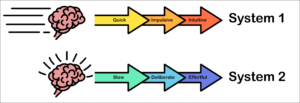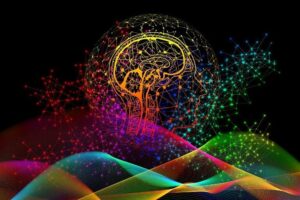
Image Courtesy: Frictionless Commerce.com
Introduction to Dual Thinking Systems
In his book, “Thinking, Fast and Slow,” Nobel laureate Daniel Kahneman revolutionizes our understanding of thought processes. He introduces two systems: System 1, swift and intuitive, working effortlessly; and System 2, deliberate and analytical, engaging in controlled thinking. As an Emotional Intelligence Certified Practitioner, discovering the principles of these systems, emphasizes for me the crucial role that emotional intelligence plays in connecting their distinct modes.
The Role of Emotional Intelligence
#Emotionalintelligence, often defined as the ability to recognize, understand, and manage one’s own emotions, as well as the ability to empathize with others, is closely intertwined with both System 1 and System 2 thinking.
Emotional Intelligence and System 1
System 1, shaped by intuition and quick judgments, is our instant response to a situation, based on mental shortcuts and heuristics formed by emotions and past experiences. Here, emotional intelligence guides quick decisions with heightened emotional awareness. Refining emotional intelligence enhances the regulation of automatic responses, preventing impulsivity and fostering thoughtful decision-making even in the heat of the moment.
Emotional Intelligence and System 2
On the flip side, System 2 thinking, which involves deliberate reasoning and analysis, benefits from emotional intelligence in different ways. Understanding our emotions and those of others enhances our capacity for empathy, a crucial component of effective interpersonal communication.
As we dive into System 2, the knack for recognizing and understanding emotions becomes pivotal. It’s the key to crafting well-informed judgments and decisions that embrace not just logic, but also the vibrant human element.
Emotional Intelligence as a Bridge
Emotional intelligence, therefore, acts as a bridge between the rapid, instinctive processes of System 1 and the more deliberate, analytical nature of System 2. It facilitates a harmonious interplay between the two systems. This ensures that our emotions positively contribute to decision-making rather than clouding our judgment.
Personal Growth and Resilience With EI
Further, the cultivation of emotional intelligence holds promise for personal growth and resilience. By becoming attuned to our emotions and developing the skills to manage them effectively, individuals can navigate the complexities of life with greater ease. This encompasses adapting to change, handling stress, and building strong, empathetic relationships. It serves as a testament to the far-reaching implications of emotional intelligence across various aspects of our lives.
Connect With Me
The principles outlined in “Thinking, Fast and Slow” illuminate the intricate dance between our intuitive and deliberate thinking processes. Emotional intelligence emerges as a key player in this ‘cognitive choreography’, offering a nuanced understanding of our emotions that enhances both System 1 and System 2 thinking. As we delve into the depths of the human mind, emotional intelligence emerges as a guiding beacon. It leads us toward more thoughtful, adaptive, and interconnected thinking. Connect with me at chandini.khanna@gmail.com to uncover, build, and strengthen your emotional intelligence – unlocking the path to mastering thoughtful and adaptive thinking.

